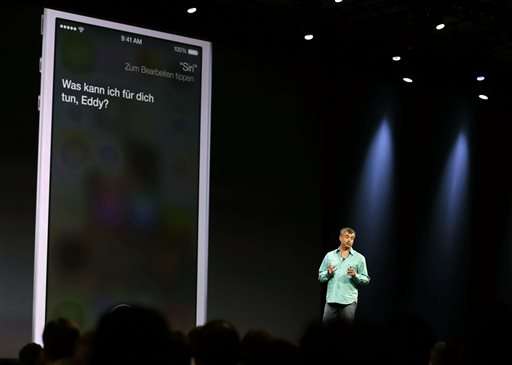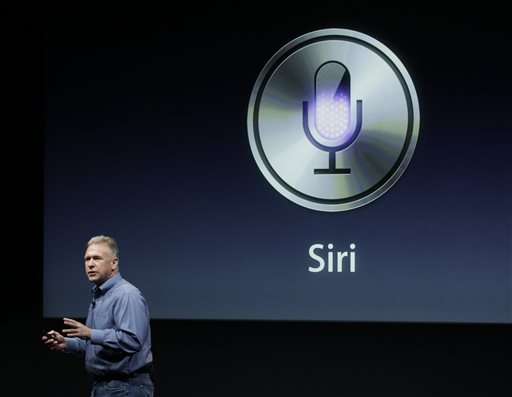Apple's next big challenge: Making Siri smarter

Apple's Siri made a big splash when the wisecracking digital assistant debuted on the iPhone five years ago. But as other tech giants jockey to build intelligent "chat bots" and voice-controlled home systems capable of more challenging artificial-intelligence feats, Siri at times no longer seems cutting edge.
On Monday, Apple is expected to demonstrate an upgrade to Siri's smarts as it kicks off its annual software conference. It's a potentially momentous time for the company; sales of its flagship iPhone are slowing, and AI is emerging as a key tech battleground. Apple, Google, Facebook and others are racing to create digital services that consumers will find indispensable for shopping, chatting, controlling other appliances and simply getting through their daily lives.
And while Siri has gained new abilities over the years, some experts believe Apple still lags in the AI race, hindered in part by its unwillingness to pry too deeply into your personal information.
"Google Now has kind of eaten their lunch," said Chris Monberg, co-founder of Boomtrain, a startup that makes artificial intelligence software used by online retailers. Monberg argues that Google's proactive digital assistant provides more useful reminders, recommendations and tips on local weather or traffic, largely because it reads his email and other data from his Android phone and crunches it with sophisticated algorithms on Google's powerful servers.
Amazon's Echo home speaker likewise has its fans; it recognizes informal voice commands and can order flowers, pizza or a ride to the airport. Similarly, many analysts believe the future lies in plans by Facebook, Google and Microsoft to incorporate intelligent "bots" into the voice- and text-messaging services that people use to chat with their friends.
In some respects, Siri remains plenty competitive, at least so long as you stick with Apple's other services. If an iPhone owner uses Google's Gmail, for instance, Apple's software may not scan those emails for useful information. But Jan Dawson, a tech analyst at Jackdaw Research, notes that Siri can volunteer helpful reminders from the Apple calendar, offer suggestions based on a user's location, or search for images stored in Apple's photo app.
Still, some experts say Apple is at a disadvantage with Google, which has compiled vast quantities of data—about individual users and consumer trends—from its search engine, Gmail, maps and other popular online services. (Many of those Google services remain popular on the iPhone, despite Apple's best efforts to replace them.)
With AI, "systems get much better the more they know about the user," said Alan Black, an expert in voice-enabled technology at Carnegie Mellon University. And while today's smartphones have powerful processors, he added, they don't have the capabilities of more specialized processors used in big data centers.
Apple collects plenty of data from its users, but hasn't "focused on connecting all the dots," said Raj Singh, co-founder of Tempo AI, an artificial intelligence startup acquired by Salesforce.com last year.

Google, of course, makes money from advertising that's keyed to individual interests. Apple, which makes most of its money from iPhones, says its software respects customer privacy by working with an individual's data on the iPhone or iPad, while anonymizing information that's uploaded to its servers.
"We don't mine your email, your photos, or your contacts in the cloud to learn things about you," Apple VP Craig Federighi said at the company's Worldwide Developers Conference last year. "We honestly just don't want to know."
Apple declined comment on plans for Siri. Last fall, however, Apple acquired a startup that makes AI software specifically for mobile devices, and another that helps computers carry on extensive voice conversations. And tech news sites have reported Apple may loosen its restrictions on Siri's ability to work directly with other companies' software. That could enable Siri to book a restaurant reservation on command, or order a ride from a car service, rather than show a link to an app like Open Table or Uber and requiring the user to do the rest.
Imposing that extra step may seem like a classic "first-world problem"—hardly a serious burden. "We're getting lazier as technology is getting smarter," joked Forrester Research analyst Julie Ask. But for tech companies, she added, money and power flows from providing the software that consumers use to interact with other companies and services.
Along with new Siri features, Apple is expected to unveil other software improvements for its iPhones, iPads and Mac computers. Analysts are also predicting an overhaul of Apple's music service. And after Apple's dust-up with the FBI earlier this year over its iPhone security, some believe Apple might announce new security measures to protect users' data.
Experts say the quality of Apple's software and online services is increasingly critical to maintaining its popularity with consumers.
Services like Siri, Apple Music and Apple Pay add significant value to the iPhone and other Apple devices, Dawson said. "They're important to keeping the Apple ecosystem attractive."
© 2016 The Associated Press. All rights reserved.


















